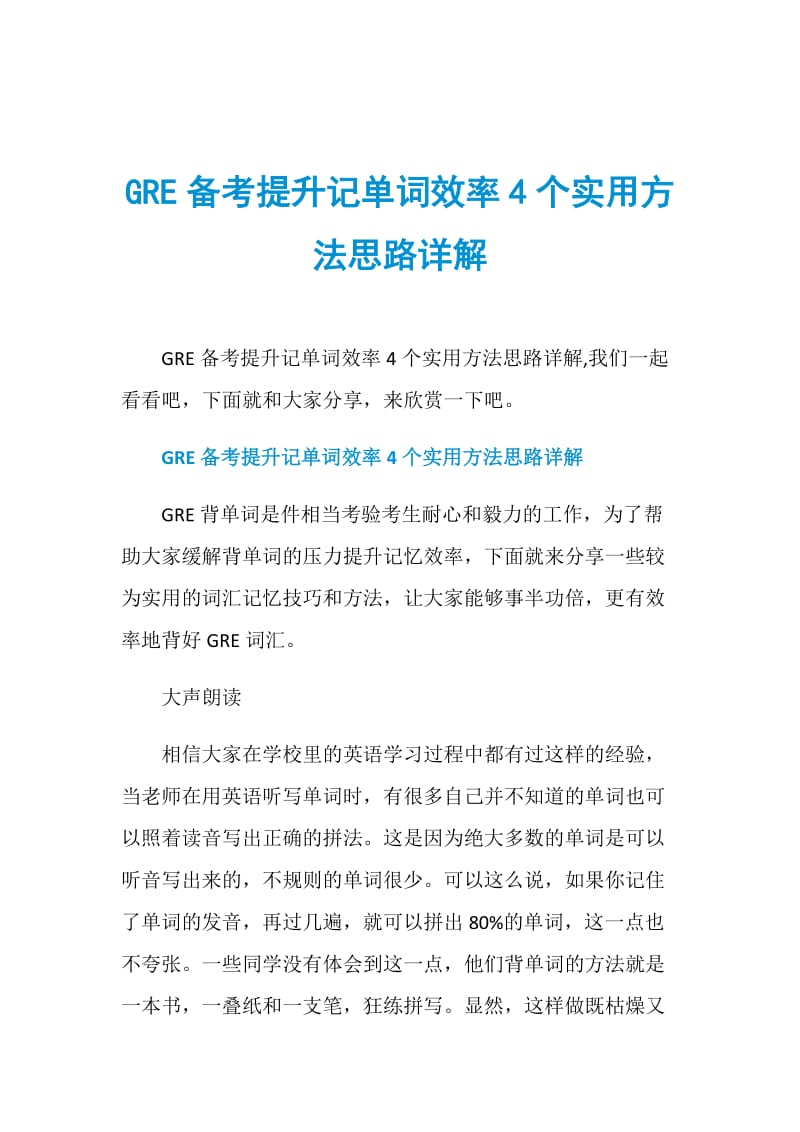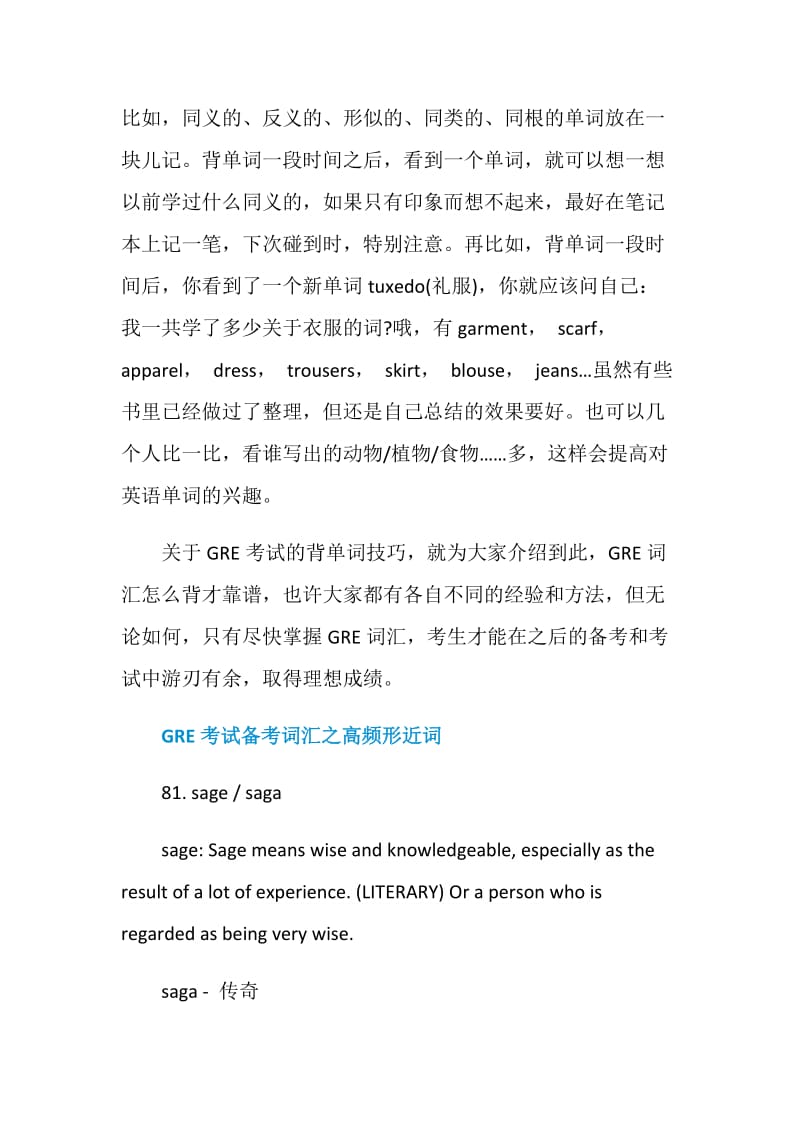 GRE备考提升记单词效率4个实用方法思路详解.doc
GRE备考提升记单词效率4个实用方法思路详解.doc
《GRE备考提升记单词效率4个实用方法思路详解.doc》由会员分享,可在线阅读,更多相关《GRE备考提升记单词效率4个实用方法思路详解.doc(16页珍藏版)》请在三一办公上搜索。
1、GRE备考提升记单词效率4个实用方法思路详解 GRE备考提升记单词效率4个实用方法思路详解,我们一起看看吧,下面就和大家分享,来欣赏一下吧。GRE备考提升记单词效率4个实用方法思路详解GRE背单词是件相当考验考生耐心和毅力的工作,为了帮助大家缓解背单词的压力提升记忆效率,下面就来分享一些较为实用的词汇记忆技巧和方法,让大家能够事半功倍,更有效率地背好GRE词汇。大声朗读相信大家在学校里的英语学习过程中都有过这样的经验,当老师在用英语听写单词时,有很多自己并不知道的单词也可以照着读音写出正确的拼法。这是因为绝大多数的单词是可以听音写出来的,不规则的单词很少。可以这么说,如果你记住了单词的发音,再
2、过几遍,就可以拼出80%的单词,这一点也不夸张。一些同学没有体会到这一点,他们背单词的方法就是一本书,一叠纸和一支笔,狂练拼写。显然,这样做既枯燥又低效。记住,要背单词,第一的要诀就是把它正确的读出来,然后你可以按照读音规则进行拼写。这样一举两得,既背会了单词,又练会了单词的发音,为将来能讲一口流利而纯正的英语打下了良好的基础。边学边练人与人之间交流的基本单位是句子而不是单词。只有学以致用,真正将所学单词用于日常生活、学习、工作环境中,只有能随心所欲的使用所学新单词、新语句与他人交流,才算得上真正掌握了单词。记住了单词在某一语境中的用法,不但可以在遇到此情况时可熟练地运用此单词,还可以举一反三
3、,将此单词用在相似的语境中,从而真正掌握单词的用法,达到活学活用的目的。重复记忆一个单词一次只要背上几遍,十几遍即可,但是背过之后要不断地复习,特别是在脑子里复习。在脑子里多过几遍是非常重要的。另外还要不断地找机会使用,就可以将之牢牢地记在脑海里。注意联系当然,可能刚开始时能建立联系的单词很少,但要注意培养这种意识,争取一串串地背单词,看见一个,就能想起一串。比如,同义的、反义的、形似的、同类的、同根的单词放在一块儿记。背单词一段时间之后,看到一个单词,就可以想一想以前学过什么同义的,如果只有印象而想不起来,最好在笔记本上记一笔,下次碰到时,特别注意。再比如,背单词一段时间后,你看到了一个新单
4、词tuxedo(礼服),你就应该问自己:我一共学了多少关于衣服的词?哦,有garment, scarf, apparel, dress, trousers, skirt, blouse, jeans虽然有些书里已经做过了整理,但还是自己总结的效果要好。也可以几个人比一比,看谁写出的动物/植物/食物多,这样会提高对英语单词的兴趣。关于GRE考试的背单词技巧,就为大家介绍到此,GRE词汇怎么背才靠谱,也许大家都有各自不同的经验和方法,但无论如何,只有尽快掌握GRE词汇,考生才能在之后的备考和考试中游刃有余,取得理想成绩。GRE考试备考词汇之高频形近词81. sage / sagasage: Sag
5、e means wise and knowledgeable, especially as the result of a lot of experience. (LITERARY) Or a person who is regarded as being very wise.saga - 传奇82. whim / rim / brimwhim: A whim is a wish to do or have something which seems to have no serious reason or purpose behind it, and often occurs suddenl
6、y.brim: If someone or something is brimming with a particular quality, they are full of that quality.When your eyes are brimming with tears, they are full of fluid because you are upset, although you are not actually crying.rim -表?边缘83. flit / flip / fleetflit: If you flit around or flit between one
7、 place and another, you go to lots of places without staying for very long in any of them.If an expression flits across your face or an idea flits through your mind, it is there for a short time and then goes again.flip: If you flip a device on or off, or if you flip a switch, you turn it on or off
8、by pressing the switch quickly.(=flick)If you flip through the pages of a book, for example, you quickly turn over the pages in order to find a particular one or to get an idea of the contents.If you say that someone is being flip, you disapprove of them because you think that what they are saying s
9、hows they are not being serious enough about something.fleet - 短暂的84. lull / gull / dulllull: A lull is a period of quiet or calm in a longer period of activity or excitement.gull:考察的经常是gullible 表?容易被骗的85. rash / rehashrash: If someone is rash or does rash things, they act without thinking carefully
10、 first, and therefore make mistakes or behave foolishly.rehash: If you describe something as a rehash, you are criticizing it because it repeats old ideas, facts, or themes, though some things have been changed to make it appear new.86. grin / chagringrin: A grin is a broad smile.If you grin and bea
11、r it, you accept a difficult or unpleasant situation without complaining because you know there is nothing you can do to make things better.chagrin: Chagrin is a feeling of disappointment, upset, or annoyance, perhaps because of your own failure. (FORMAL, WRITTEN)87. voluble / voluminousvoluble: If
12、you say that someone is voluble, you mean that they talk a lot with great energy and enthusiasm. (FORMAL)voluminous: Something that is voluminous is very large or contains a lot of things. (FORMAL)88. virtue / virtual / virus89. paean / panache / panaceapaean: A paean is a piece of music, writing, o
13、r film that expresses praise, admiration, or happiness. (LITERARY)(=eulogy)(赞歌,凯歌)panache: If you do something with panache, you do it in a confident, stylish, and elegant way.panacea - 万能灵药90. premise / surmise / demisesurmise: If you surmise that something is true, you guess it from the available
14、evidence, although you do not know for certain. (FORMAL)GRE考试备考词汇之高频形近词91. employ / deploy / ploydeploy: To deploy troops or military resources means to organize or position them so that they are ready to be used.ploy: A ploy is a way of behaving that someone plans carefully and secretly in order to
15、 gain an advantage for themselves.(策略)92. apposite / oppositeapposite: Something that is apposite is suitable for or appropriate to what is happening or being discussed. (FORMAL)93. object / objection / objective / objectivityobjective: Objective information is based on facts.94. lurid / lucidlurid:
16、 If you say that something is lurid, you are critical of it because it involves a lot of violence, sex, or shocking detail.95. covet / covert / overtcovet: If you covet something, you strongly want to have it for yourself.(FORMAL)covert: Covert activities or situations are secret or hidden. (FORMAL)
17、overt: An overt action or attitude is done or shown in an open and obvious way.96. stationary / stationerystationary: Something that is stationary is not moving.(=static)97. supple / supplement / supplicatesupple: A supple object or material bends or changes shape easily without cracking or breaking
18、.supplicate: A supplicant is a person who prays to God or respectfully asks an important person to help them or to give them something that they want very much. (FORMAL)98. binge / hinge / fringebinge: If you go on a binge, you do too much of something, such as drinking alcohol, eating, or spending



- 配套讲稿:
如PPT文件的首页显示word图标,表示该PPT已包含配套word讲稿。双击word图标可打开word文档。
- 特殊限制:
部分文档作品中含有的国旗、国徽等图片,仅作为作品整体效果示例展示,禁止商用。设计者仅对作品中独创性部分享有著作权。
- 关 键 词:
- GRE 备考 提升 单词 效率 实用 方法 思路 详解
 三一办公所有资源均是用户自行上传分享,仅供网友学习交流,未经上传用户书面授权,请勿作他用。
三一办公所有资源均是用户自行上传分享,仅供网友学习交流,未经上传用户书面授权,请勿作他用。




链接地址:https://www.31ppt.com/p-52234.html